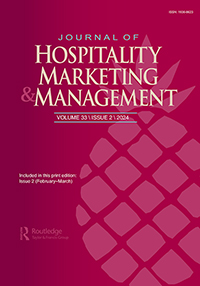The mediating role of organizational identification between corporate social responsibility dimensions and employee opportunistic behavior: Evidence from symmetric and asymmetric approach triangulation
IF 11.9
1区 管理学
Q1 BUSINESS
Journal of Hospitality Marketing & Management
Pub Date : 2022-09-13
DOI:10.1080/19368623.2022.2123075
引用次数: 7
Abstract
ABSTRACT Hospitality studies on corporate social responsibility (CSR) have largely examined its role in stimulating positive behaviors but overlooked its role in preventing negative behaviors among employees. Drawing from social identity theory, the present study addresses this gap by investigating four CSR dimensions’ impact on employee opportunistic behavior. The joint use of covariance-based structural equation modeling (SEM) and fuzzy-set qualitative comparative analysis (fsQCA) supported examining the research model. Using two-wave data from 281 U.S. hospitality employees, SEM findings reveal that legal and philanthropic dimensions of CSR serve as a valuable shield against opportunistic behavior. Moreover, organizational identification (OI) fully mediates the effects of economic, legal, and ethical CSR on opportunistic behavior, whereas philanthropic CSR exerts no effect through OI. This study advances CSR studies by examining the CSR–opportunistic behavior nexus using combined symmetric and asymmetric approaches. FsQCA findings make a methodological contribution to the net effects of CSR, by determining two configurations that explain opportunistic behavior.组织认同在企业社会责任维度和员工机会主义行为之间的中介作用:来自对称和非对称方法三角测量的证据
酒店业对企业社会责任(CSR)的研究在很大程度上考察了其在激励积极行为方面的作用,但忽视了其在预防员工消极行为方面的角色。根据社会认同理论,本研究通过调查四个企业社会责任维度对员工机会主义行为的影响来解决这一差距。基于协方差的结构方程建模(SEM)和模糊集定性比较分析(fsQCA)的联合使用支持了对研究模型的检验。利用281名美国酒店业员工的两波数据,SEM发现,企业社会责任的法律和慈善层面是抵御机会主义行为的宝贵屏障。此外,组织认同(OI)完全中介了经济、法律和道德企业社会责任对机会主义行为的影响,而慈善企业社会责任不通过OI发挥作用。本研究通过使用对称和非对称相结合的方法来检验企业社会责任-机会主义行为关系,从而推进企业社会责任研究。FsQCA的研究结果通过确定两种解释机会主义行为的配置,对CSR的净效应做出了方法学贡献。
本文章由计算机程序翻译,如有差异,请以英文原文为准。
求助全文
约1分钟内获得全文
求助全文
来源期刊
CiteScore
20.90
自引率
6.40%
发文量
33
期刊介绍:
The Journal of Hospitality Marketing & Management serves as a peer-reviewed platform dedicated to advancing understanding, practice, and education in hospitality marketing and management. It strives to foster the development of knowledge and theory by promoting new ideas, models, approaches, and paradigms. Embracing a multifaceted approach that spans administrative disciplines, liberal arts, and social sciences, the journal disseminates knowledge through high-quality, peer-reviewed research papers, reports, and book reviews. It stands as a unique forum for the community of students, academics, and practitioners who share a common interest and commitment to the field of hospitality marketing and management.

 求助内容:
求助内容: 应助结果提醒方式:
应助结果提醒方式:


